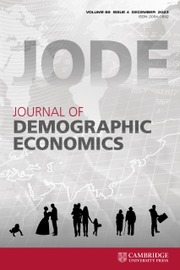Article contents
Optimal education policy and human capital accumulation in the context of brain drain
Published online by Cambridge University Press: 07 November 2019
Abstract
This paper revisits the question of how brain drain affects the optimal education policy of a developing economy. Our framework of analysis highlights the complementarity between public spending on education and students' efforts to acquire human capital in response to career opportunities at home and abroad. Given this complementarity, we find that brain drain has conflicting effects on the optimal provision of public education. A positive response is called for when the international earning differential with destination countries is large, and when the emigration rate is relatively low. In contrast with the findings in the existing literature, our numerical experiments show that these required conditions are in fact present in a large number of developing countries; they are equivalent to those under which an increase in emigration induces a net brain gain. As a further contribution, we study the interaction between the optimal immigration policy of the host country and education policy of the source country in a game-theoretic framework.
- Type
- Research Papers
- Information
- Copyright
- Copyright © Université catholique de Louvain 2019
Footnotes
This paper benefited from the helpful suggestions of three anonymous referees. It was initiated when the first author was visiting the Department of Economics of the University of Cyprus. Slobodan Djajić wishes to thank the Department for its hospitality and support. Frédéric Docquier acknowledges financial support from the EOS programme of the Flemish (FWO) and French-speaking (FRS-FNRS) communities of Belgium (convention 30784531 on “Winners and Losers from Globalization and Market Integration: Insights from Micro-Data”).
References
- 10
- Cited by


